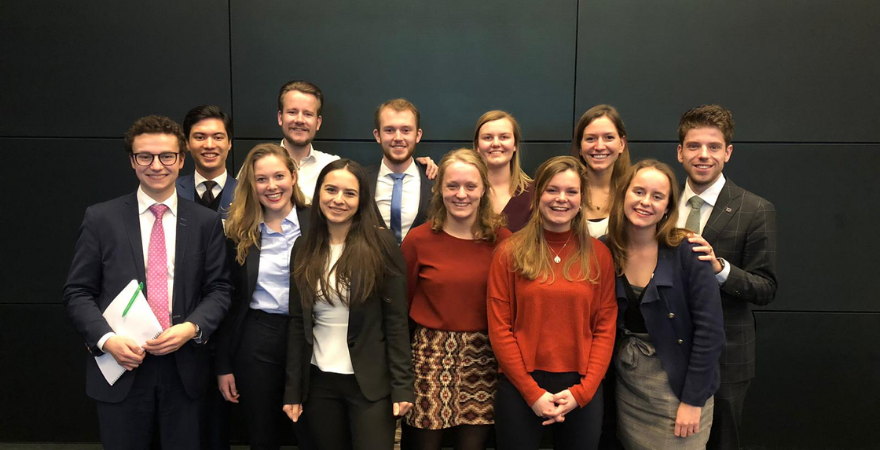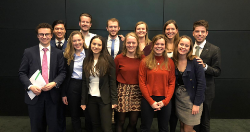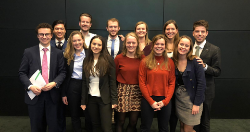Robin Klabbers, Jessica Sakalauskas, and Andrew van Olst are One Young World incoming Enterprise for Peace Scholars from the Netherlands. It is the second year in a row that One Young World and the Ministry of Foreign Affairs of the Kingdom of the Netherlands work together to empower a cohort of 50 Enterprise for Peace Scholars by welcoming them to the One Young World Summit 2019.
They are also part of the West Wing, a Think Tank of students and young professionals founded by the Ministry of Foreign Affairs of the Kingdom of the Netherlands to develop creative and innovative solutions for current policy challenges.
LinkedIn: Robin Klabbers, Jessica Sakalauskas, Andrew van Olst
The views expressed in this article reflect those of the author, not those of One Young World.

The Future of Work
The nature of work and the workplace are rapidly changing. From the rise of the gig-economy facilitated by online platforms such as Airbnb, Uber, and Etsy, to artificial intelligence applications in healthcare capable of identifying abnormalities on medical scans, the manifestations of the Future of Work (FoW) are profoundly transforming society and the labour market. At the same time, demographic transitions are influencing the workforce available to fill jobs in the future - Europe is facing the challenges of an ageing population with increased pressure on social security systems, while sub-Saharan Africa struggles to find suitable work for the millions of young people entering the labour market each year.
Potential and pitfalls
While the trends of the FoW offer unparalleled opportunities, at the same time, they threaten to exacerbate inequalities as the gap widens between those with the capacity to adapt to these changing circumstances and those who lack these means. Informed policy intervention with targeted investments is imperative to harnessing the potential of the FoW and ensuring decent jobs for all. To this end, the Sustainable Economic Development Department and the Social Development Department (DDE/DSO) of the Dutch Ministry of Foreign Affairs (MFA), commissioned the West Wing – a think tank of students and young professionals – to investigate the possible effects of the FoW and draft corresponding policy recommendations.
A unique setting with distinct challenges
Much of the existing research conducted on the FoW is oriented towards Western labour markets. Little is known about the implications of FoW trends for sub-Saharan Africa – a unique setting that will house over a quarter of the worlds under 25 population by 2030. In sub-Saharan Africa, 10 to 12 million youths enter the labour market each year while annual job creation falls short at 3.1 million. Failure to capitalize on this demographic dividend has resulted in large scale youth unemployment, a phenomenon that is not without consequences as bleak job prospects and poor living conditions have been linked to civil unrest and migration out of Africa.
A case study for Ethiopia: the Future of Work for smallholder farmers
To address the gap in knowledge regarding the impact of FoW for sub-Saharan Africa, we, the DDE/DSO track of the West Wing Think Tank, conducted a case study of the manifestations of the FoW in Ethiopia with a focus on the agricultural sector. The central goal of this year-long project was to draft recommendations for the Dutch MFA that would allow young Ethiopian smallholder farmers to benefit in an inclusive way from developments related to the FoW.
How will the Future of Work manifest itself in Ethiopia?
Trends associated with the FoW are not equally applicable in all settings. We identified mechanization, online platforms, big data and artificial intelligence to be the four FoW manifestations most likely to play a role in Ethiopia in the coming years.
Mechanization: 70% of the Ethiopian labour force is employed in the agricultural sector, a sector characterized by smallholder farming with only 0.7% of plots currently using agriculture machinery. Mechanization of farming can not only increase productivity but has the potential to create both up- and downstream job opportunities.
Online platforms: Over 80% of Ethiopia’s 3.8 million active social media users are between 18 and 34 years of age, suggesting online platform usage will only increase as the population rejuvenates. This medium holds the potential to facilitate linkage between young people and other stakeholders and facilitate the life-long learning that the FoW requires.
Big data: In 2015, Addis Ababa housed over 700 computer technology companies and 95 software businesses operating both domestically and abroad. Large-scale agricultural datasets hold the power to reform and optimize agricultural processes, for instance advising regions on fertilizer use or mapping the effect of environmental degradation.
Artificial intelligence (AI): The first AI solutions for the agricultural sector based on visual recognition software are rapidly emerging including smartphone applications that detect crop diseases based on photos. These AI applications can have significant spillover effects in other sectors.
Internet access: a sine qua non
With the exception of mechanization, all of the manifestations of the FoW in Ethiopia will require internet access. Internet access is no longer a luxury, but rather a vital necessity for growth and development. For this reason, the West Wing Think Tank recommends that above all, the Dutch MFA should support the increase in inclusive, sustainable and open internet access for all Ethiopian citizens. Other recommendations include investments in building local digital knowledge, using the full potential of existing data, creating a data market and promoting knowledge sharing through open-access online courses. Women, the illiterate, and citizens in rural areas must be included when implementing these recommendations to ensure that existing inequalities are not increased.
To read the full policy brief, click here


